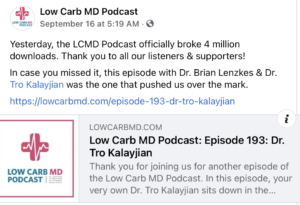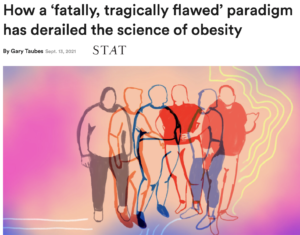Help Americans Get Healthy Again
A healthy American economy should include healthy Americans.
Yet most Americans are not healthy and suffer from a range of lifestyle-related health problems. Insulin resistance is now seen as the major underlying condition for a wide range of chronic conditions. The calories in, calories out concept is ‘tragically flawed,’ new research suggests (Today, September 20, 2021) reports:
The paper, published in the American Journal of Clinical Nutrition offers an alternative model to the eat-less-move-more message and argues that success in weight loss, as well as weight-loss maintenance, is more about what you eat and less about how much you eat.
Weight loss, the study found, is all about our hormonal response to certain macronutrients. Study authors include several of the most prominent nutrition scientists in the country.
Most doctors, nutritionists, and public health officials have long placed the blame for obesity on people themselves, and advise eating less and exercising more. Then when people can’t stick to calorie-restricted diets, doctors prescribe medications, then more medications, and sometimes modern “minimally invasive” bariatric surgery to constrict the stomach.
Critics blame the packaged food industry, advertising, drug companies, overworked doctors, and for-profit health insurance and hospitals. There’s plenty of blame to go around for Americans struggling with obesity, diabetes, prediabetes, high blood pressure and heart disease, and other chronic conditions.
But here is the good news! It’s the dawn of a new day and a new paradigm for nutrition and public health and new hope for the metabolically unhealthy, and not from any new diets or medications. Gary Taubes explains what went wrong in STAT News, How a ‘fatally, tragically flawed’ paradigm has derailed the science of obesity:
For nearly a century, obesity research has been predicated on the belief that the cause of the disorder “is an energy imbalance between calories consumed and calories expended,” to quote the World Health Organization. By this ubiquitous thinking, obesity is an energy balance disorder: People get fat because they take in more calories than they expend. They stay lean when they don’t.
This is the central dogma of obesity science. Virtually all obesity research is interpreted in the context of this balance principle; all related public health discussions, not just on obesity but on all the common chronic diseases that associate with it, as well as the very nature of a healthy diet, rely fundamentally on its implications.
The concept that obesity is essentially an energy balance disorder, a problem of calories in and calories out, is “the number one concept that starts everything,” as Harvard researcher Bruce Spiegelman said when I interviewed him in 2019. “If you’re a serious scientist,” he added, “it’s just kind of obvious.”…
This is why I am now a co-author, along with 16 influential academic researchers, of a lengthy review the American Journal of Clinical Nutrition is publishing on Sept. 13. The principal author is David Ludwig, a professor of pediatrics at Harvard Medical School and of nutrition at the Harvard T.H. Chan School of Public Health. We argue that the reason so little progress has been made against obesity and type 2 diabetes is because the field has been laboring, quite literally, in the sense intended by philosopher of science Thomas Kuhn, under the wrong paradigm.
How a ‘fatally, tragically flawed’ paradigm has derailed the science of obesity (STAT, September 13, 2021)
The journal publication referenced: The carbohydrate-insulin model: a physiological perspective on the obesity pandemic (The American Journal of Clinical Nutrition, September 13, 2021)
Americans are over-medicated for chronic conditions that could be better treated by adjusting what they eat and when they eat (time-restricted eating, for example). Low-carb and intermittent fasting claims may have sounded fringe a few years ago, but now success stories are spreading rapidly. A recent example:

Yesterday, the LCMD Podcast officially broke 4 million downloads. Thank you to all our listeners & supporters!In case you missed it, this episode with Dr. Brian Lenzkes & Dr. Tro Kalayjian was the one that pushed us over the mark.
And a fast-expanding organization, The Society of Metabolic Health Practitioners (SMHP) supports provides training and support for nutritional intervention practices to reduce insulin resistance.
To make matters worse for millions of Americans, the pandemic hit people with poor metabolic health the hardest. See, for example: CDC study finds about 78% of people hospitalized for Covid were overweight or obese, (CNBC, March 9, 2021).
Again, the reality is that public health officials and policies, along with most of the health care community still believe in the “energy imbalance” theory for obesity. They continue to advise “eat less and exercise more.” Exercise is healthy, but just walking or even running isn’t enough without changing what we eat and when (not the same as “just eat less”). Most can lose weight for while by eating less, but soon resting metabolism steps down, leaving us cold and miserable. So most gain back lost weight, sometimes gaining more.

